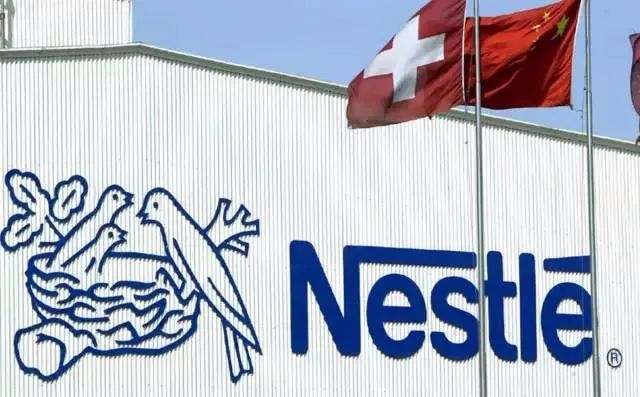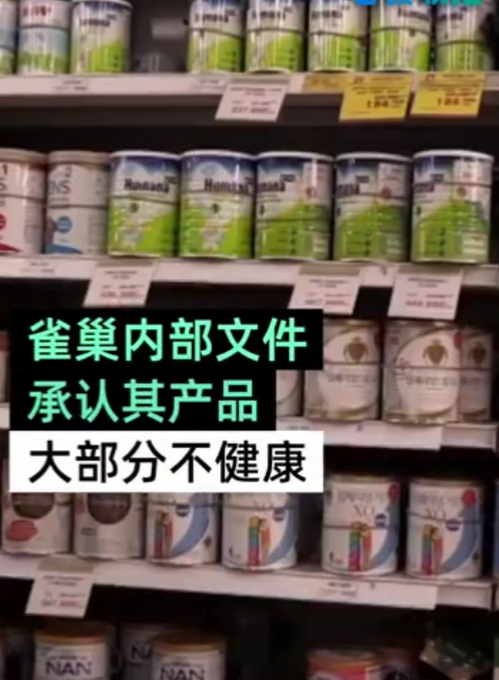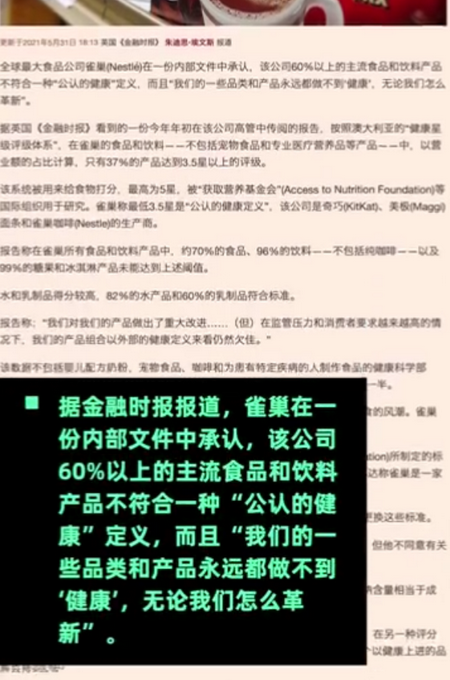Nestl é admits that most of the products are unhealthy. What is the product mix analysis of Nestl é products?
Nestl é, the world's largest food company, is in trouble again.

Several media pointed out that Nestl é admitted that most of its products were unhealthy, and Nestl é admitted in the report that "our product portfolio is still poor in terms of external health definition."
And take the initiative to admit that most products are unhealthy because they are questioned by Australia's "health star rating system".

Nestl é admitted in an internal document that more than 60 per cent of its mainstream food and beverage products did not meet "recognized health" standards, according to the Chinese website of the Financial Times. and "some of our categories and products will never be 'healthy', no matter how much we innovate".

In response to the internal report that "more than 60 per cent of food and beverages do not meet recognized health standards", Nestl é responded today that the rating system "cannot cover everything". The assessment included only about half of Nestl é's total products, with products such as medical nutrition, pet food, coffee and baby milk powder excluded from the analysis.
Nestl é said: 60% is not for our entire product portfolio-it excludes some key categories, Nestl é only analyzes about half of the product portfolio, and the company is adjusting the nutrition and health strategy of its products. Review the entire product portfolio to ensure that products meet people's nutritional needs.
According to several media reports, Nestl é's definition of "health" comes from Australia's "Health Star" (health star) scoring system, which rates products on the basis of five stars, which are considered to be the "accepted definition of health". Of all Nestl é food and beverage products, about 70 per cent of food and beverages (excluding plain coffee) and 99 per cent of confectionery and ice cream products failed to meet these thresholds, the report said.
Nestl é said: it is studying the entire product portfolio at different stages of people's lives to ensure that products help meet their nutritional needs and support a balanced diet.
For example, Nestl é has significantly reduced sugar and sodium in its products over the past 20 years, by 14-15% in the past seven years alone.
In addition, Nestl é responded to "finding a balance between happiness and enjoyment" after it was revealed that the food was unhealthy. "
Nestl é, headquartered in Switzerland and founded in 1866, is the world's largest food manufacturer. It started out by producing baby food and is now a producer of products such as KitKat, Maggi noodles and Nestle coffee (Nestle), according to public data.
On April 22, Nestl é released its first-quarter results for 2021, which showed total sales of 21.1 billion Swiss francs (151.559 billion yuan) in the first quarter, up 1.3% from a year earlier and the biggest quarterly increase in a decade.
This good result is mainly due to the increased consumer demand for coffee, dairy products and pet care products during the COVID-19 epidemic.
In terms of specific product categories, the financial report shows that coffee, cooking products, dairy products and confectionery products in China have all achieved double-digit growth. Nestle's global pet care sales rose 8.7% compared with the same period last year. Sales of coffee powder and coffee liquid beverages rose 9.9% year-on-year, and dairy products rose 15.7%. The coffee business contributed the most to growth due to growing consumer demand for premium coffee, Nestle coffee and Starbucks products, with an increase of 16.3%.
After its best quarterly performance in a decade in the first quarter, Nestl é also said: for the full year of 2021, Nestl é believes that organic sales growth will continue to grow at a medium single-digit rate.
Today, regardless of whether Nestl é can grow or not, what needs to be addressed is that most of its products are unhealthy. Nestl é says it is considering what new commitments will be made to consumers' nutritional needs, and hopes to announce plans this year.
* Image source: Internet
Important Notice :
前街咖啡 FrontStreet Coffee has moved to new addredd:
FrontStreet Coffee Address: 315,Donghua East Road,GuangZhou
Tel:020 38364473
- Prev

Coffee leaf rust may be able to suppress KONA coffee EPA emergency approval of fungicides
More information on coffee beans Please follow Coffee Workshop (official Wechat account cafe_style) it has been at least 150 years since coffee leaf rust was discovered, and it has been eight months since it was first detected in Maui, Hawaii, in October 2020. Shortly after that, it was also found on the big island of Hawaii in November 2020.
- Next

What does YYDS mean? Rui Lucky's application for registration of the "YYDS crooked Ace" trademark has aroused heated discussion!
Rui Lucky applied to register the YYDS crooked Ace trademark and triggered a heated discussion among netizens. According to the APP information, Luckin Coffee (China) Co., Ltd. applied to register the trademarks of YYDS Ace, Ruixing Ice Caf é YYDS and Ruixing Ice Cafe on May 20, in which YYDS Ass belongs to the catering and accommodation category, and Ruixing Ice Cafe YYDS has two categories: convenience food and catering accommodation.
Related
- The ceremony is full! Starbucks starts to cut the ribbon at a complimentary coffee station?!
- A whole Michelin meal?! Lucky launches the new "Small Butter Apple Crispy Latte"
- Three tips for adjusting espresso on rainy days! Quickly find the right water temperature, powder, and grinding ratio for espresso!
- How much hot water does it take to brew hanging ear coffee? How does it taste best? Can hot water from the water dispenser be used to make ear drip coffee?
- What grade does Jamaica Blue Mountain No. 1 coffee belong to and how to drink it better? What is the highest grade of Blue Mountain coffee for coffee aristocrats?
- What are the flavor characteristics of the world-famous coffee Blue Mountain No. 1 Golden Mantelin? What are the characteristics of deep-roasted bitter coffee?
- Can I make coffee a second time in an Italian hand-brewed mocha pot? Why can't coffee be brewed several times like tea leaves?
- Hand-brewed coffee flows with a knife and a tornado. How to brew it? What is the proportion of grinding water and water temperature divided into?
- What is the difference between Indonesian Sumatra Mantinin coffee and gold Mantinin? How to distinguish between real and fake golden Mantelin coffee?
- What does bypass mean in coffee? Why can hand-brewed coffee and water make it better?

